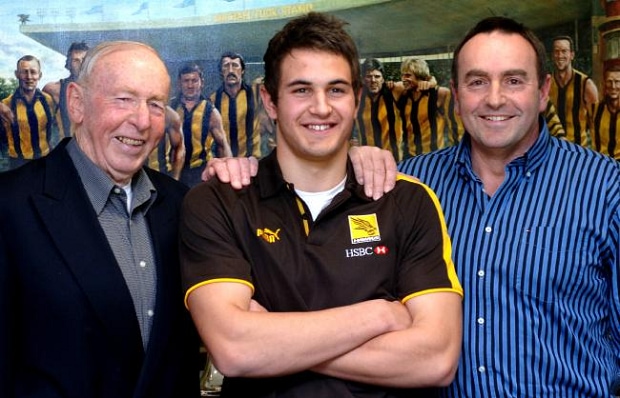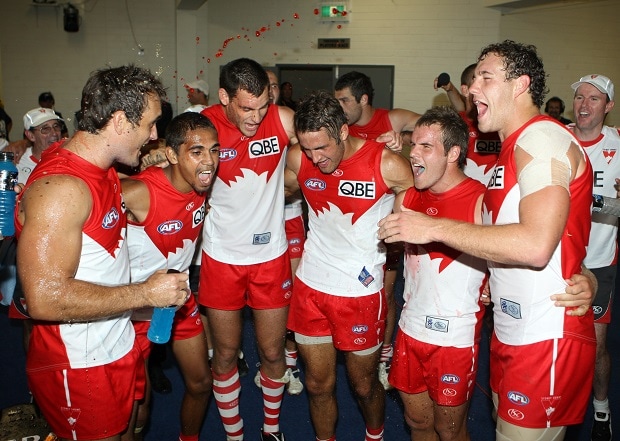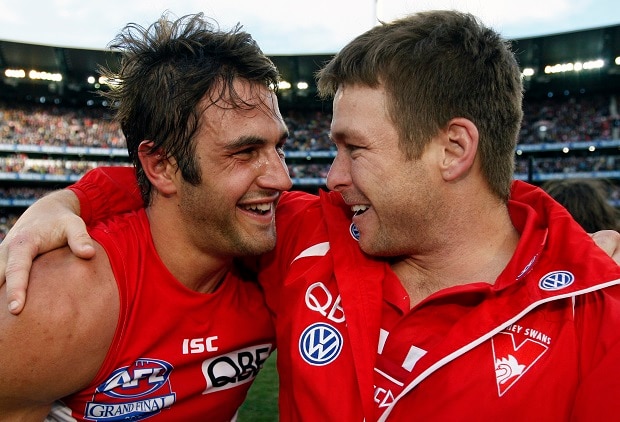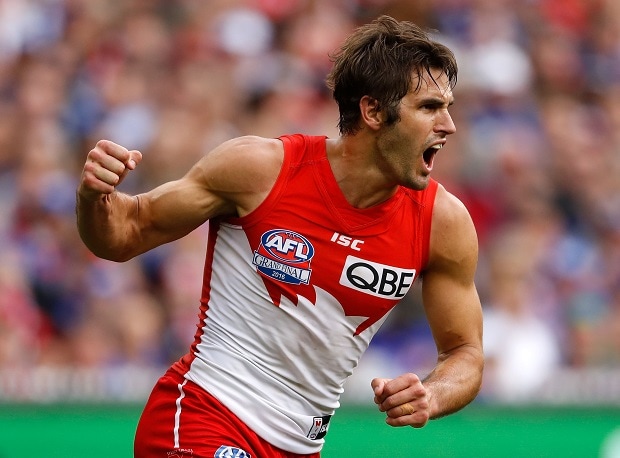From his well documented but humble beginnings at Hawthorn to his rapid rise to prominence in Sydney, Josh Kennedy has accomplished plenty in his 10 seasons in the AFL.
After receiving few opportunities at the Hawks, where the family name is held in high regard, Kennedy's trade to the Swans has proven to be fruitful.
A premiership, three Bob Skilton medals, three All Australian honours and countless of other awards later, the 28-year-old can now add captain to his glowing and growing football resume.
To celebrate his appointment as 2017 skipper, sydneyswans.com.au takes a look back at the making of Captain Kennedy.
2006
The son of the gun had officially arrived.
Nominated as a father-son selection ahead of the 2006 National Draft, Josh Kennedy, son and grandson of Hawthorn greats John Kennedy Jr and John Kennedy Snr, finally landed at the Hawthorn Football Club.
2007
Kennedy had his work cut out during his first year at the Hawks, given the calibre of like-for-like midfielders running around in brown and gold at the time.
He was a consistent performer for Hawthorn’s VFL affiliate Box Hill during his first season, using his bigger frame and athleticism to his advantage, in particularly around stoppages.
It would be a sign of things to come.
2008
Wearing the No. 36 on his back, Kennedy made his AFL debut against Melbourne in Round 9. He collected 16 disposals (seven contested) and laid three tackles in a promising outing.
The then 19-year-old was retained for the next two games but missed the following round as competition for spots within the soon-to-be premiers heated up.
He unfortunately wasn’t seen in the senior side again for the remainder of the season, much to the frustration of a player who was already showing the attributes of a competent inside midfielder.

A fresh-faced Josh Kennedy poses with grandfather, John Kennedy Snr, and, father John Kennedy Jr, after being drafted to Hawthorn in 2006.
2009
Kennedy, who switched to the No. 32 jumper, toiled at VFL level during the first half of the season desperate to break into a senior side which had just come off winning the 2008 premiership. He was given limited opportunities and managed only one game to Round 14.
A straight-down-the-line chat with coach Alastair Clarkson towards the end of the year confirmed that, with the Hawks' midfield group well stocked, there were no guarantees in 2010 despite Kennedy playing the final nine games of the regular season.
He explored his options and decided to take up an opportunity in Sydney after coach Paul Roos flagged a keen interest in the up-and-comer.
Kennedy accepted a three-year offer and, alongside Hawks teammate Ben McGlynn, joined the Swans in return for picks 39, 46 and 70 in the forthcoming National Draft.
2010
Kennedy got down to business during his first pre-season with the Club, his new teammates immediately gained a sense of his ultra-professional approach to both his own football and the team's cause.
He wouldn't miss a beat nor put a foot wrong, playing every game of season 2010 while averaging more than 20 disposals a game in a Sydney Swans midfield boasting Jude Bolton, Ryan O'Keefe, Brett Kirk, Jarrad McVeigh and Kieren Jack.
He'd finish third in the Bob Skilton Medal behind winner Jack and runner-up Shane Mumford. His workman-like performances in the Swans' two finals games would earn him the Paul Roos Award as the best player in finals.

Kennedy (middle right) and teammates Daniel Bradshaw, Lewis Jetta, Mark Seaby, Ben McGlynn and Shane Mumford celebrate their first win in the red and white.
2011
Kennedy would enjoy another consistent season in 2011, averaging 22 possessions a game, while his durability would come to the fore after missing only one game (Round 5) that season.
Many started to take notice of his ability to perform in big games by now. Against eventual premiers Geelong, Kennedy collected 29 disposals (21 of which were contested), kicked a goal and laid 10 tackles. His semi-final against Hawthorn was also immense after touching the ball 35 times, including 25 contested possessions, all the while tallying 16 clearances.
Both games were losses but it only reinforced the fact Kennedy never took a defeat lying down.
Adam Goodes won his third Bob Skilton Medal that season with Kennedy and Rhyce Shaw finishing equal runners-up.
2012
It was a huge season for Kennedy and the Sydney Swans in 2012.
He would become a premiership player, All Australian and Club Champion by year's end, setting a record for the most votes ever polled in a Bob Skilton Medal count.
He'd also finish equal eighth in the Brownlow Medal, collecting 19 votes as the highest placed Swan, five of which were earned from his two performances against former side in Hawthorn.
Teammates took notice as well, anointing Kennedy as that season's Paul Kelly Players' Player Award.
Statistically, this was the season in which Kennedy the contested and clearance king would be anointed. He would set the benchmark that year as the competition's leader in both stats columns, a feat which would set the tone over the next four seasons.

Kennedy is embraced by former Hawthorn teammate and current assistant coach Stuart Dew following the 2012 Premiership win.
2013
Kennedy added another honour to his growing CV after being added to the Sydney Swans leadership group ahead of the 2013 season, joining co-captains Jarrad McVeigh and Kieren Jack plus Adam Goodes, Jude Bolton, Nick Smith, Ted Richards, Rhyce Shaw and Ryan O’Keefe in the nine-man squad.
Kennedy's renowned consistency remained throughout the year, averaging more than 27 disposals a game, including a run of 30, 33 and 29 in the Swans' three games against (you guessed it!) Hawthorn
In light of injuries to key personnel, Kennedy's importance to the side grew significantly in 2013. For the second time in his short tenure at the Sydney Swans, he'd claim third in the Bob Skilton Medal behind winner Jarrad McVeigh and runner-up Kieren Jack.
2014
Kennedy was again a vital cog in another successful season for the Sydney Swans.
In the wake of Brett Kirk and Jude Bolton's retirements in 2011 and 2013 respectively, Kennedy became the side's number one inside midfielder and flourished with the extra responsibility.
His durability was also highlighted when Kennedy was a notable absentee for the Swans' final two rounds of the season. It was the first time he'd missed a game since Round 5, 2011.
It took an exceptional year by young gun Luke Parker to pip Kennedy for the Bob Skilton Medal.
2015
Kennedy took his game to a whole new level in 2015, breaking through to win his second Club Champion award after a colossal season on-field.
He averaged more than 30 disposals a game, a level of consistency bolstered by an incredible run of 11 consecutive games of 30+ possessions from Round 14 to the Qualifying Final against Fremantle in Perth.
In the absence of midfield counterparts in Luke Parker and Kieren Jack, Kennedy stood tall as the Swans bowed out of the premiership race.
2016
Kennedy again stamped his authority as the competition's best for contested and clearance player, setting new records along the way. He collected a record 425 contested possessions this season, eclipsing his own career and AFL best set in 2012. His tally from 2013 ranks third (410).
He was again hard to miss when called upon in the big games, no better example than in the Grand Final loss to the Western Bulldogs when Kennedy produced a super human performance to try and will his side across the line.
Kennedy then joined an illustrious list by winning his third Bob Skilton Medal at the October count, again pipping Dan Hannebery in the final standings. He'd also share the prize for best player in finals alongside Heath Grundy.
McVeigh and Jack would stand down as co-captains, paving the way for Kennedy to announced as the new skipper for the upcoming season. It is the first time the Sydney Swans have had a stand-alone captain since Stuart Maxfield in 2005.

A player made for the big stage.


